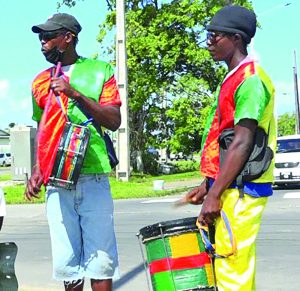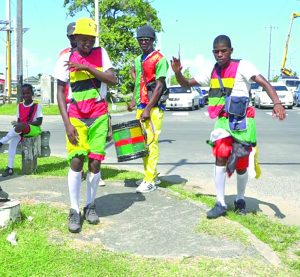By Rupa Seenaraine
“Street theatre brought to life” most fittingly describes the tradition of masquerading during Christmas in Guyana. It is a sight to captivate the attention of the masses, but one that had been evidently dying with the passing of every year.
With roots dating back decades, masquerade has formed part of the holiday tradition, and the older folks would attest to the popularity of this practice as Christmas Day nears. 




Decked out in vibrantly sewn accoutrement sporting all the flair, the dancers would bend and contort their bodies in the most cinematic way, making sure everyone around was magnetised to their performance. Their dance is typically accompanied by drums and flutes, shaping a unique cadence.
Especially in Georgetown, the intersection of commercialised streets or shopping zones would most certainly see a group of dancers, or maybe more, trying to appease the crowds with their animated acts. And whether you’re window-shopping, busy in the bustle, or simply passing by, it is definitely a treat for the eyes.
History finds masquerading as a part of the Guyanese tradition with the coming of African slaves under British rule. It is said that the Ibo and Yoruba tribes of West Africa imbedded this art form in their celebration of the harvest festival and “when the gods visited”. Over time, those under slavery in the Caribbean would practise their culture during the relaxed setting at Christmas time, creating a new tradition as the years elapsed.
Other than Christmas, Mashramani in February would see the resurgence of the masquerading sequel.
Now, a sprinkling of masqueraders surface leading up to the holidays, and the sight of teenage boys taking over the role is fading. However, new generations are still trying to breathe life into the culture.
Guyana Times caught up with Collin Holder, who hails from the community of Victoria on the East Coast of Demerara. Together with about a dozen boys, he shared that with the passing of older generations, it has been a challenge to keep the practice alive. He managed to put together a group of boys, and they have been able to perform along the busy city streets.
On Vlissengen Road, the seasoned masquerader was taking a short break from the scorching heat when he expressed, “Most of the old folks just passed, so the younger ones [are] now picking it up. I just love this, so I just come and pick it up back, and get the youths, train them to dance, and come out on the holidays.”
He added, “Every year, we’re out here to just have fun. This is our culture, masquerade. It’s about 10 to 15 years since I’m doing it with these little guys here. School closed and the guys coming out.”
And he is correct. Even with sightings of masqueraders on the street, the flair once seen with older groups has faded, with lesser grace and agility now attending the dances. Now the flute is absent in a majority of bands, and is replaced with makeshift drums and jingling instruments.
Holder said early November would mark the start of their preparation for the season. They would get their outfits stitched together, and ensure the drums were intact to hit the streets. From the early morning hours until sundown, the show would go on. They would retire home and prepare to return after the next dawn appeared.
“In November, I started making the costumes, get the seamstress to sew their clothes and prepare to come out. We started, and up to now we’re on the road. If not here, we’re at Lamaha, sometimes Main Steet. Around the town, we’re just moving and dancing, keeping it alive.”
Over at Mandela Avenue, another group led by Simon Pompey is also buzzing. He hails from Ann’s Grove on the East Coast of Demerara. Having recognized that the tradition was slowly becoming extinct, the 25-year-old said he rounded up a group of boys within the community to master the art form. But they are still learning, as they practise on the streets.
“I started from small, growing up knowing it’s our culture. So, I decided to continue with it. I used to play with a masquerade band, and to continue the culture, I created my own band…It’s our culture, so I think we should show some respect to it. We want to keep up the culture, and we like the music,” he shared.
Even with a permit, he said, there are some challenges when law enforcement officers are monitoring the traffic situation at some points. But Pompey said the upliftment from people who enjoy their performance is their driving force to return.




